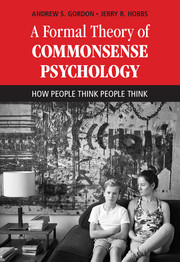Book contents
- Frontmatter
- Contents
- Part I Commonsense Psychology
- Part II Background Theories
- Introduction
- 5 Eventualities and Their Structure
- 6 Traditional Set Theory
- 7 Substitution, Typical Elements, and Instances
- 8 Logic Reified
- 9 Functions and Sequences
- 10 Composite Entities
- 11 Defeasibility
- 12 Scales
- 13 Arithmetic
- 14 Change of State
- 15 Causality
- 16 Time
- 17 Event Structure
- 18 Space
- 19 Persons
- 20 Modality
- Part III Commonsense Psychology Theories
- Appendix A First-Order Logic
- References
- Index
Introduction
from Part II - Background Theories
Published online by Cambridge University Press: 01 September 2017
- Frontmatter
- Contents
- Part I Commonsense Psychology
- Part II Background Theories
- Introduction
- 5 Eventualities and Their Structure
- 6 Traditional Set Theory
- 7 Substitution, Typical Elements, and Instances
- 8 Logic Reified
- 9 Functions and Sequences
- 10 Composite Entities
- 11 Defeasibility
- 12 Scales
- 13 Arithmetic
- 14 Change of State
- 15 Causality
- 16 Time
- 17 Event Structure
- 18 Space
- 19 Persons
- 20 Modality
- Part III Commonsense Psychology Theories
- Appendix A First-Order Logic
- References
- Index
Summary
The rest of this book is heavy on logic; that's what the word “Formal” in the title means. But we believe the book has value beyond the formalization, in the systematic development of the content of the theories, and we would not like to see readers put off by their lack of familiarity or comfort with logic. The logic we use is neither deep nor especially complicated. So we have included an appendix on first-order logic that gives a gentle introduction to all the logic one needs for understanding the axioms in this book.
Even those comfortable and familiar with logicmay find it profitable to look over Sections 7 and 8 of the appendix. Section 7 presents our view that commonsense theories are not to be built up by definitions resting ultimately on a set of primitive concepts, in a kind of “Euclidian” program. Rather every predicate is, in a sense, a primitive, but they all occur in axioms that constrain their possible meanings more or less tightly. The most fundamental concepts in commonsense knowledge cannot be defined precisely with necessary and sufficient conditions. The most we can hope for is to characterize them as precisely as possible with lots of necessary conditions and lots of sufficient conditions. Then Section 8 presents the most common patterns we use in the axioms, and it should reduce their perceived complexity for the reader.
The focus of this book is commonsense psychology. But this is a very complex domain, and it rests on a number of other nonpsychological domains. Before talking about belief, we have to talk about logic. Before doing goals and plans, we need a theory of causality. We can't axiomatize scheduling until we handle time. In Part II we develop these and other background theories.
The theories, one per chapter, fall into two broad categories. Some provide required mathematical infrastructure that will be needed everywhere or argue for fundamental ontological commitments necessary for getting any effort to encode commonsense knowledge off the ground. In Chapter 5 we reify “eventualities”, or states and events, by treating them as first-class individuals in the logic. In Chapter 7 we make a similar move with typical elements of sets, or reified universally quantified variables.
- Type
- Chapter
- Information
- A Formal Theory of Commonsense PsychologyHow People Think People Think, pp. 91 - 92Publisher: Cambridge University PressPrint publication year: 2017



